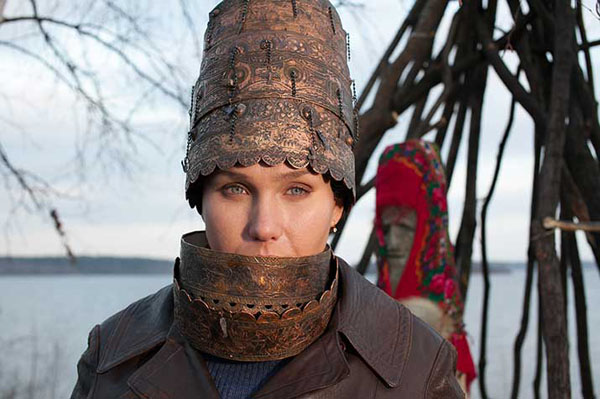The 24th annual New York Jewish Film Festival, presented by the Jewish Museum and the Film Society of Lincoln Center, opens tonight and runs through January 29. “A number of this year’s sidebars and titles do not just stretch the already-loose definitions of Judaism, Jewishness and Judaica, they bypass them altogether,” notes Howard Feinstein in his overview of this year’s edition for Filmmaker. “The NYJFF appears to be diluting its unique identity on the path toward a more comfortable fit into the world of non-specialized general fests.” Further in:
Of the large number of films (out of 47 features and shorts) that broach the subject of assimilation, Russian director Alexey Fedorchenko’s Angels of Revolution provides a model for exploring the metamorphosis. In this anarcho-surrealist exercise based on an actual episode in 1934 known as the Great Samoyedic War, Jews do not resist the melting pot. The USSR’s Peoples Commissariat of Ethnicities exports a band of avant-garde artists and thinkers, nonconformists themselves and many of them Jews, to seduce through Art–the great unifier–the Khanty and Nenet tribes in the Kazym region in the far North. They have nixed the government’s demand for cultural collectivism that runs afoul of their ancient traditions. Friendly persuasion proving to be unproductive, the authorities resort to force.
His other must-sees are Maxime Giroux’s Felix and Meira, Michael Verhoeven’s Let’s Go!, Daniel Burman’s The Mystery of Happiness and Ronit Elkabetz and Shlomi Elkabetz’s Gett: The Trial of Viviane Amsalem.
The NYJFF “offers welcome restorations of several rare silent classics,” notes the New Yorker‘s Richard Brody. In A Child of the Ghetto (1910), D.W. Griffith “packs a remarkable density of incident and emotion into a mere sixteen minutes.” And in Ernst Lubitsch‘s Three Women (1924), “a dissolute financial speculator sets his sights on a wealthy widow in order to replenish his fortune…. As the self-interested roué’s plan kicks into high gear, the cynical comedy darkens to operatic drawing-room melodrama, but Lubitsch anchors the resulting violence with a piercing, subtle intimacy.”
In the L, Jordan Cronk recommends Kon Ichikawa‘s Fires on the Plain (1959), a “harrowing antiwar film” that “follows tubercular WWII Japanese soldier Tamura (Eiji Funakoshi), dismissed by his company and encouraged to commit suicide as a result of his illness, across a scorched-earth landscape of rotting corpses and cannibalistic infantrymen…. Shooting in high-contrast black-and-white and with steely reserve reflective of both character and shooting conditions alike, Ichikawa manages to engender a sense of intimacy even as his vision of hell on earth builds to seemingly irreconcilable ends.”
Update, 1/24: For the Hollywood Reporter, Frank Scheck reviews William Gazecki’s “loving documentary” The Outrageous Sophie Tucker; The Muses of Isaac Bashevis Singer, “far too genteel a title for Shaul Betser and Asaf Falay’s documentary about the Nobel Prize-winning author”; and Joseph Dorman and Oren Rudavsky’s The Zionist Idea, in which the movement is “recounted in exhaustive and sometimes exhausting fashion.”
For news and tips throughout the day every day, follow @KeyframeDaily. Get Keyframe Daily in your inbox by signing in at fandor.com/daily.




